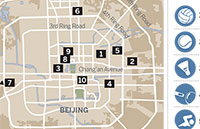Survey finds 77 percent of Chinese families are happy
By SHAN JUAN (China Daily) Updated: 2016-06-29 08:12Satisfaction rises with age, education and stable marriage; experts call for govt support
Who is happiest in China?
Women have a slight edge, but men are not far behind, according to a government-backed survey. And the happiness quotient goes up with age, and among people who are still in their first marriage.
Undertaken last year by the China Population Communication Center, a subsidiary of the National Health and Family Planning Commission and Chinese Academy of Social Sciences, the survey sampled nearly 6,000 people from seven provinces and municipalities, including Beijing.
Nearly 77 percent of respondents said they had a happy family, with more than 22 percent of those saying they felt very happy with their families, a slight increase over 2014, according to Yao Hongwen, head of the center.
Happiness in various categories was rated on a 1 to 10 scale, with 10 being most happy. Respondents clustered just above midrange in most categories. Overall, Chinese people registered a happiness quotient of 6.6, the survey found.
The survey found a difference between men and women, but not much. As a group, women weighed in on the happiness scale at 6.68, while men trailed at 6.52.
People in their first marriages registered a happiness quotient of 6.65, compared with divorced people, who averaged 6.12. Unmarried people fell between the two at 6.35.
One clear pattern seemed to emerge by age and education.
People become happier, on average, as they get older. Respondents younger than 19 years put their happiness level at 6.09, while those 80 or above rated theirs at 6.93.
When it comes to education, the more the happier. People with less than a primary school education logged in at 6.48, while those with an advanced degree ranked their happiness at 6.98.
Generally speaking, urbanites felt a bit happier (6.67) than their counterparts in rural areas (6.54), the survey found.
People reporting unhappy families were usually migrants, victims of natural disasters or living in single-parent families.
"The family is an important determinant of happiness. Therefore the government should intensify its policies and measures supporting families and facilitating family development," Yao said on Friday.
Such measures should include housing, education, healthcare, insurance and elderly care, said Wang Guangzhou, a researcher at the academy's Population and Labor Economics Institute.
As economic growth slows, greater attention should be paid to underprivileged groups, particularly young bachelors who hold rural hukou, or residence permits, he said.
Yao agreed. "Family happiness concerns national stability, and the government should heed that and ensure equity, particularly in education and healthcare, to help the left-behind develop and grow," he said.
Family happiness is determined by a basket of factors such as health, education, age, gender, marital status and public issues, he said.
The survey found that emerging issues-environmental pollution and food safety crises, for example-seriously erode family happiness. Those who have better tolerance for pollution reported happier lives than those with low tolerance, it said.
For food safety, about one-third of respondents said they had purchased unsafe food. Lack of easy access to consumer protection channels-the ability to lodge a complaint-meant that little could be done about it, the survey said.
According to Wang, the situation will change for better on the heels of the new food safety law that was enacted in October.
- Li to open investment door wider
- Real names required for phone apps
- Report identifies LGBT preferences in capital
- Survey finds 77 percent of Chinese families are happy
- Overseas buyers swoop for China's armored vehicles
- Chinese women snap up millions of bikinis every year
- Chinese premier vows further cooperation with Kyrgyzstan
- Chinese economy can conquer challenges: Li
- Elderly bear brunt of tornado's fury
- Launch center drives Hainan tourism










